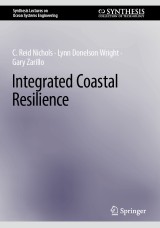Details

Integrated Coastal Resilience
Synthesis Lectures on Ocean Systems Engineering
|
CHF 59.00 |
|
| Verlag: | Springer |
| Format: | |
| Veröffentl.: | 04.09.2024 |
| ISBN/EAN: | 9783031681530 |
| Sprache: | englisch |
| Anzahl Seiten: | 100 |
Dieses eBook enthält ein Wasserzeichen.
Beschreibungen
<p>The potential for natural hazards and vulnerability to these threats varies from community to community. Adaptation will require ongoing monitoring of the natural and built-up environments and the development of policies, structures, and approaches to ensure resilient communities. Resilient approaches involve assessing risk and vulnerability, identifying solutions to reduce risks, implementing viable solutions, and assessment. Owing to past damages from extreme weather, countries around the world are making significant investments in coastal infrastructure that will reduce risks from disasters that are exacerbated by climatic changes.</p>
<p>Preface.- Acknowledgments.- Introduction.- Types of Hazards.- Examples.- Effects.- Vulnerability.- Disaster Trends.- Impacts.- Human Factors.- Effective Management.- Bibliography.- Glossary of Terms.</p>
<p>C. Reid Nichols is the President/Oceanographer of Marine Information Resources Corporation, a veteran-owned small business focused on applied science and a professor of business administration at Stevenson University. Reid enlisted into the U.S. Marine Corps reserves in 1977 and retired as a Colonel in 2012. Reid is actively involved in the planning and execution of oceanographic research, worldwide. Reid is a certified Project Management Professional and has coauthored Recent Advances and Issues in Oceanography, Encyclopedia of Marine Science, Tomorrow’s Coasts: Complex and Impermanent, and Marine Environmental Characterization. Reid earned a bachelor’s degree in psychology from University of Maryland Baltimore County, Master of Science degree in physical oceanography from North Carolina State University, Master of Business Administration degree from Loyola University Maryland, and a Doctor of Business Administration from University of Maryland Global Campus.</p>
<p>The potential for natural hazards and vulnerability to these threats varies from community to community. Adaptation will require ongoing monitoring of the natural and built-up environments and the development of policies, structures, and approaches to ensure resilient communities. Resilient approaches involve assessing risk and vulnerability, identifying solutions to reduce risks, implementing viable solutions, and assessment. Owing to past damages from extreme weather, countries around the world are making significant investments in coastal infrastructure that will reduce risks from disasters that are exacerbated by climatic changes.</p>
Coastal resilience is an important focus area for federal, state, and local government agencies Integrates environment, engineering, and community Coastal resilience requires collaboration among basic researchers, program managers, and citizen scientists
Diese Produkte könnten Sie auch interessieren:

Water Quality Hazards and Dispersion of Pollutants

von: Wlodzimierz Czernuszenko, Pawel Rowinski

CHF 177.00















